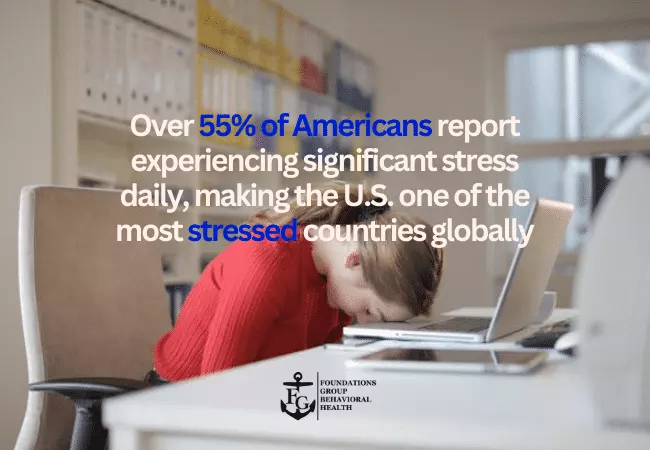Stress is an unavoidable part of life. While some stress can motivate action and enhance performance, chronic or overwhelming stress can have devastating effects on mental health. Prolonged stress is a significant risk factor for depression, transforming temporary challenges into long-term emotional distress. Recognizing the connection between stress and depression, understanding the signs, and seeking the right treatment are essential steps toward recovery.
In this guide, we’ll explore how stress can lead to depression, the role of co-occurring disorders, and how programs like an Anxiety Treatment Program, Depressive Disorder Treatment Program, and structured options such as Psychiatric Day Treatment can help individuals regain balance and mental well-being.
The Science Behind Stress and Depression
What Is Stress?
Stress is the body’s natural response to perceived challenges or threats. It triggers the release of stress hormones like cortisol and adrenaline, preparing the body for a “fight or flight” response. While this reaction is helpful in short bursts, prolonged activation of the stress response can lead to significant physical and emotional strain.
What Is Depression?
Depression is a clinical mental health condition characterized by persistent feelings of sadness, hopelessness, and a loss of interest in activities. It impacts thoughts, behaviors, and physical health, often requiring professional intervention for recovery.
How Stress Leads to Depression
- Biological Impact:
- Chronic Stress Hormones: Prolonged stress keeps cortisol levels elevated, impairing the brain’s ability to regulate mood and increasing the risk of depression.
- Neurotransmitter Imbalance: Stress depletes serotonin, dopamine, and norepinephrine, which are critical for mood regulation.
- Emotional Exhaustion:
- Persistent stress erodes emotional resilience, making it harder to cope with challenges and increasing vulnerability to depressive symptoms.
- Behavioral Changes:
- Stress often leads to unhealthy coping mechanisms, such as social withdrawal, substance use, or avoiding responsibilities, which can exacerbate depressive symptoms.
Common Stressors That Lead to Depression
1. Workplace Stress
- High-pressure jobs, job insecurity, and conflicts with colleagues create chronic stress, leading to burnout and an increased risk of depression.
2. Financial Struggles
- Worrying about debt, bills, or financial instability can lead to feelings of helplessness and despair.
3. Relationship Conflicts
- Difficulties in personal relationships, such as breakups, family conflicts, or caregiving responsibilities, often serve as significant stressors.
4. Major Life Events
- Stressful transitions like relocating, changing careers, or losing a loved one can overwhelm emotional coping mechanisms and trigger depressive episodes.
5. Chronic Health Conditions
- Prolonged physical illness or pain not only adds stress but also increases the likelihood of depression.
The Role of Co-Occurring Disorders in Stress and Depression
Stress and depression often co-occur with other mental health conditions, such as anxiety or substance use disorders. Addressing these co-occurring conditions is critical for successful treatment.
How Co-Occurring Disorders Develop
- Anxiety: Chronic stress can evolve into anxiety disorders, which, when unmanaged, often lead to depression.
- Substance Use: Individuals may turn to drugs or alcohol to self-medicate stress, creating a cycle of dependency and depression.
Why Integrated Care Matters
- A Co-Occurring Disorder Treatment Program simultaneously addresses all contributing conditions, ensuring comprehensive and effective care.
Recognizing the Signs of Stress-Related Depression
Stress-related depression often begins subtly, making it crucial to recognize the early warning signs before the condition worsens. It involves a combination of emotional, physical, behavioral, and cognitive symptoms that may affect daily functioning. Understanding these signs can help individuals seek timely intervention and effective treatment.
Emotional Symptoms
- Persistent Sadness: Feelings of hopelessness, worthlessness, or guilt that linger for weeks or months.
- Irritability or Frustration: Quick temper or feeling overwhelmed by even minor inconveniences.
- Loss of Pleasure: A diminished interest in activities once enjoyed, such as hobbies, socializing, or exercise.
- Feelings of Helplessness: A sense of being stuck or unable to manage stressors effectively.
Physical Symptoms
- Chronic Fatigue: Persistent exhaustion that does not improve with rest, often accompanied by a lack of energy.
- Appetite Changes: Significant weight loss or gain due to overeating or loss of appetite.
- Sleep Disturbances: Insomnia, frequent waking during the night, or excessive sleeping (hypersomnia).
- Unexplained Aches and Pains: Stress-related tension can manifest as headaches, back pain, or muscle soreness.
Behavioral Symptoms
- Social Withdrawal: Avoidance of friends, family, and social activities due to a lack of motivation or fear of judgment.
- Procrastination: Difficulty starting or completing tasks, often coupled with feelings of being overwhelmed.
- Increased Reliance on Substances: Using alcohol, drugs, or other unhealthy coping mechanisms to manage stress and emotional pain.
- Neglecting Responsibilities: Reduced performance at work or school, missed deadlines, or failure to meet personal obligations.
Cognitive Symptoms
- Difficulty Concentrating: Trouble focusing, making decisions, or remembering important details.
- Negative Thought Patterns: Recurrent thoughts of failure, self-criticism, or fear of the future.
- Catastrophic Thinking: Tendency to anticipate the worst-case scenarios in every situation.
- Suicidal Thoughts: In severe cases, individuals may have thoughts of self-harm or suicide, signaling the need for immediate intervention.

The Impact of Stress-Related Depression on Physical Health
Stress-related depression is not confined to the mind; it has profound effects on the body as well. The interplay between emotional distress and physical health can create a vicious cycle, where worsening physical symptoms exacerbate mental health challenges.
1. Cardiovascular Health
- Increased Risk of Heart Disease: Chronic stress and depression are linked to hypertension, elevated cholesterol levels, and an increased risk of heart attacks and strokes.
- Abnormal Heart Rhythms: Stress-induced changes in the autonomic nervous system can lead to arrhythmias or palpitations.
2. Immune System Suppression
- Reduced Immunity: Prolonged stress suppresses immune function, making individuals more vulnerable to infections, colds, and chronic illnesses.
- Delayed Healing: Depression can slow the body’s ability to recover from injuries or surgeries due to impaired immune responses.
3. Digestive Problems
- Stress-Induced Gastrointestinal Issues: Symptoms like stomach aches, nausea, diarrhea, or constipation are common in individuals with stress-related depression.
- Increased Risk of Irritable Bowel Syndrome (IBS): Stress can exacerbate IBS symptoms, leading to discomfort and dietary challenges.
4. Chronic Pain
- Muscle Tension: Prolonged stress often causes tightness in the neck, shoulders, and back, leading to chronic pain conditions.
- Migraines and Headaches: Stress and depression are significant triggers for tension headaches and migraines.
5. Sleep Disruption
- Insomnia and Fatigue: Difficulty falling or staying asleep due to stress can lead to chronic fatigue, further reducing emotional resilience.
- Excessive Sleep: Alternatively, depression may cause hypersomnia, leading to lethargy and reduced productivity.
6. Weight Fluctuations
- Weight Gain: Emotional eating or reliance on high-calorie “comfort foods” can lead to significant weight gain and related health issues like diabetes.
- Weight Loss: Conversely, a lack of appetite caused by stress-related depression may result in unhealthy weight loss and nutritional deficiencies.
7. Hormonal Imbalances
- Cortisol Overload: Chronic stress keeps cortisol levels elevated, disrupting other hormonal systems and contributing to mood swings, fatigue, and physical symptoms.
- Impact on Reproductive Health: Stress-related hormonal changes can affect menstrual cycles, libido, and fertility in both men and women.
8. Long-Term Health Risks
- Chronic Conditions: Stress-related depression increases the risk of developing chronic diseases, such as diabetes, autoimmune disorders, and certain cancers.
- Premature Aging: The physical toll of chronic stress and depression can accelerate cellular aging, contributing to shorter telomeres and age-related diseases.
Treatment Options for Stress-Related Depression
Effective treatment requires addressing both stress and depression through evidence-based interventions.
1. Anxiety Treatment Program
- Helps individuals manage chronic stress and anxiety through cognitive-behavioral therapy (CBT), relaxation techniques, and mindfulness.
2. Depressive Disorder Treatment Program
- Provides specialized care for individuals experiencing depressive symptoms, combining therapies like CBT, interpersonal therapy, and medication management.
3. Psychiatric Day Treatment
- Offers intensive therapy during the day, allowing individuals to return home at night.
- Combines individual therapy, group sessions, and wellness activities to address the root causes of stress and depression.
4. Half Day Treatment Program
- A flexible option for those transitioning from intensive care or balancing treatment with other responsibilities.
- Focuses on skill development and coping strategies in a structured yet adaptable format.
5. Outpatient Mental Health Program
- Provides ongoing support through weekly therapy sessions, ideal for individuals with mild to moderate symptoms.
- Allows patients to maintain work, school, or family commitments while receiving care.
6. Co-Occurring Disorder Treatment Program
- Integrates care for stress, depression, and other conditions like substance use or anxiety.
- Focuses on holistic recovery by addressing the interplay between mental health and lifestyle factors.
How a Behavioral Health Treatment Center Can Help
A Behavioral Health Treatment Center provides a supportive environment for individuals to address stress-related depression through comprehensive and personalized care.
Key Benefits of Treatment Centers:
- Expert Guidance: Licensed therapists and psychiatrists trained in treating stress and depression.
- Comprehensive Care Plans: Tailored programs combining therapy, medication, and wellness activities.
- Community Support: Group therapy sessions foster connection and reduce feelings of isolation.
- Aftercare Services: Ongoing support to maintain emotional well-being and prevent relapse.
Conclusion
Stress is a normal part of life, but when left unmanaged, it can become a gateway to depression and other serious mental health challenges. Understanding the connection between stress and depression is the first step in addressing these issues and finding effective solutions.
Programs like Anxiety Treatment Program, Depressive Disorder Treatment Program, and Psychiatric Day Treatment provide the tools and support needed to break the cycle of stress-related depression. With expert care from a Behavioral Health Treatment Center, recovery is possible, and a healthier, more balanced life is within reach. Contact us today at 508.388.5324 to book your first session and begin your journey toward a more mindful future.
FAQ on How Stress Can Lead to Depression
How does stress lead to depression?
Chronic stress disrupts the brain’s ability to regulate mood by increasing cortisol levels and depleting neurotransmitters like serotonin and dopamine. This creates emotional exhaustion and makes individuals more susceptible to depression.
What are the signs of stress-related depression?
Signs include persistent sadness, fatigue, sleep disturbances, appetite changes, difficulty concentrating, and loss of interest in daily activities. Physical symptoms like headaches and muscle tension are also common.
Can stress-related depression affect physical health?
Yes, stress-related depression can lead to issues like heart disease, weakened immune function, chronic pain, and digestive problems. It can also exacerbate existing health conditions.
How can professional treatment help with stress-related depression?
Programs like Anxiety Treatment Program, Depressive Disorder Treatment Program, and Psychiatric Day Treatment provide tools to manage stress, address depressive symptoms, and improve overall well-being.
Are there specific treatments for stress-related depression?
Yes, treatments include Cognitive Behavioral Therapy (CBT), mindfulness techniques, medication management, and integrated care through programs like Co-Occurring Disorder Treatment Program and Outpatient Mental Health Program.








